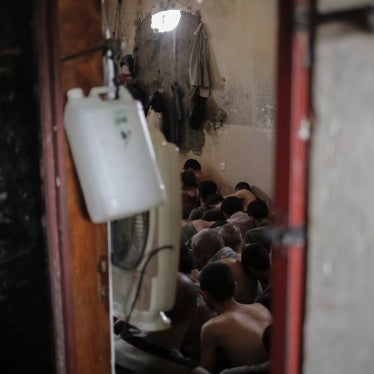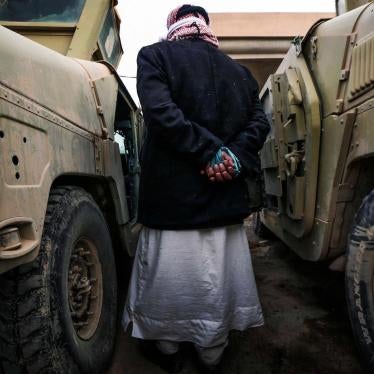The 15 Saudi detainees transferred from Guantanamo Bay to Saudi custody on May 18 are unlikely to receive a fair trial and are at risk of torture, Human Rights Watch said today. After being deprived of access to justice for years in U.S. military detention, they may face continued incarceration with no legal process in Saudi Arabia.
“The Saudi detainees have left Guantanamo but their legal rights are still at risk,” said Joe Stork, deputy director at Human Rights Watch’s Middle East and North Africa division. “The detainees certainly can’t rely on the Saudi justice system to give them a fair day in court.”
Human Rights Watch expressed concern that the treatment of several Guantanamo detainees previously transferred to Saudi Arabia – including detention without charge, solitary confinement, and denial of access to legal counsel – increased the likelihood that the 15 new detainees would be arbitrarily detained or mistreated. Saudi Arabia has a long and recent record of torture and its trials remain patently unfair.
Three prisoners transferred to Saudi Arabia from Guantanamo are still being held without trial in Riyadh’s al-Ha’ir prison. Salih al-Awshan, Mish`al al-Harbi, and Khalid al-`Unaizi, who arrived on July 20, 2005, were placed in solitary confinement for more than five months, relatives told Human Rights Watch. The authorities have not brought charges or initiated legal proceedings against them, nor allowed them to appoint defense lawyers, in violation of Saudi and international law. Officials conduct “a few interrogations, every once in a while,” a relative said. The authorities allow only close family members to visit the detainees once a month.
In other instances, former Guantanamo detainees have been convicted on legally questionable charges. Three detainees transferred into Saudi custody on May 16, 2003 were released some two years later. According to one of the former detainees, the Greater Riyadh Court in May 2005 sentenced Ibrahim al-`Umar, Fahad Abdullah Shabbati and Misha’il al-Shuddukhi, Ibrahim al-Sahli and Fawwaz al-Zahrani to six months in prison for “leaving the country without permission.” The ruling came after a four-day closed trial without representation and the men were released for time served, the detainee told Human Rights Watch. As a condition of their release, Saudi authorities prevented them from speaking openly about their experiences in Guantanamo and their time in Saudi custody.
An official with the National Society for Human Rights in Saudi Arabia, which was established in March 2004, told Human Rights Watch that the society would monitor both the treatment of the 15 detainees and their right to a fair trial, in coordination with the Saudi Ministry of Interior. The society, whose officers include government officials, has not spoken out publicly against abuse or called for public officials to be held accountable. The official said the society would seek to visit the detainees after their medical exams and initial interrogations. An Interior Ministry official confirmed that the men are being held in al-Ha’ir prison.
Human Rights Watch met with former Saudi political prisoners in February 2006, who said that they had witnessed torture in al-Ha’ir prison in 2004 and 2005. One said he himself was tortured. Mistreatment included sleep deprivation, solitary confinement, beatings, and suspending prisoners in the air by handcuffing one hand high up to a cell wall for hours at a time.
Saudi authorities are reportedly holding Majid `Affas al-Shammari, another detainee transferred from Guantanamo to Saudi custody in November 2005, in a prison in Hafr al-Batin, in the north of the country.






